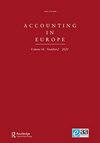Introducing More IFRS Principles of Disclosure – Will the Poor Disclosers Improve?
IF 4.3
Q1 BUSINESS, FINANCE
引用次数: 38
Abstract
Abstract The current paper was prepared for the International Accounting Standards Board (IASB) Research Forum 2017 and evaluates the effects of introducing more principles of disclosure as part of the IASB Disclosure Initiative. We perform a literature review of academic research on how entities have complied with disclosure requirements in the past. The review shows high levels of non-compliance and high volatility across entities, including poor disclosers being far below the average. We find no clear pattern of higher compliance for International Financial Reporting Standards (IFRS) with more reliance on disclosure principles as compared to specific requirements (i.e. IFRS 7, IFRS 8), but note the methodological problem of measuring compliance with disclosure principles. Academic research suggests that the degree of compliance depends on entities’ incentives for providing or withholding information in combination with local conditions for primary users, auditors and regulators. Based on our review, we argue that increased reliance on entities to act in ‘good faith’ when complying with disclosure requirements, in capital-market contexts where entities may be in high-incentive situations and have low costs of non-compliance, is potentially risky in terms of how well the Standards protect primary users from poor disclosers. More emphasis is needed on ensuring that the disclosure requirements are enforceable and auditable in order to secure a certain minimum level of disclosure.引入更多的国际财务报告准则披露原则-不良披露者会有所改善吗?
本论文是为国际会计准则理事会(IASB) 2017年研究论坛准备的,旨在评估作为IASB披露倡议的一部分引入更多披露原则的影响。我们对过去实体如何遵守披露要求的学术研究进行文献综述。审查显示,各实体的不合规程度很高,波动性也很大,包括披露不良信息的企业远远低于平均水平。与具体要求(即IFRS 7、IFRS 8)相比,我们没有发现国际财务报告准则(IFRS)更多依赖披露原则的更高合规性的明确模式,但注意到衡量披露原则合规性的方法问题。学术研究表明,合规程度取决于实体提供或隐瞒信息的动机,以及主要使用者、审计人员和监管机构的当地条件。根据我们的审查,我们认为,在资本市场背景下,在实体可能处于高激励状态且不合规成本较低的情况下,在准则保护主要用户免受不良披露者影响的程度方面,增加对实体在遵守披露要求时“善意”行事的依赖具有潜在风险。需要更加强调确保披露要求是可执行和可审计的,以便确保某种最低程度的披露。
本文章由计算机程序翻译,如有差异,请以英文原文为准。
求助全文
约1分钟内获得全文
求助全文

 求助内容:
求助内容: 应助结果提醒方式:
应助结果提醒方式:


